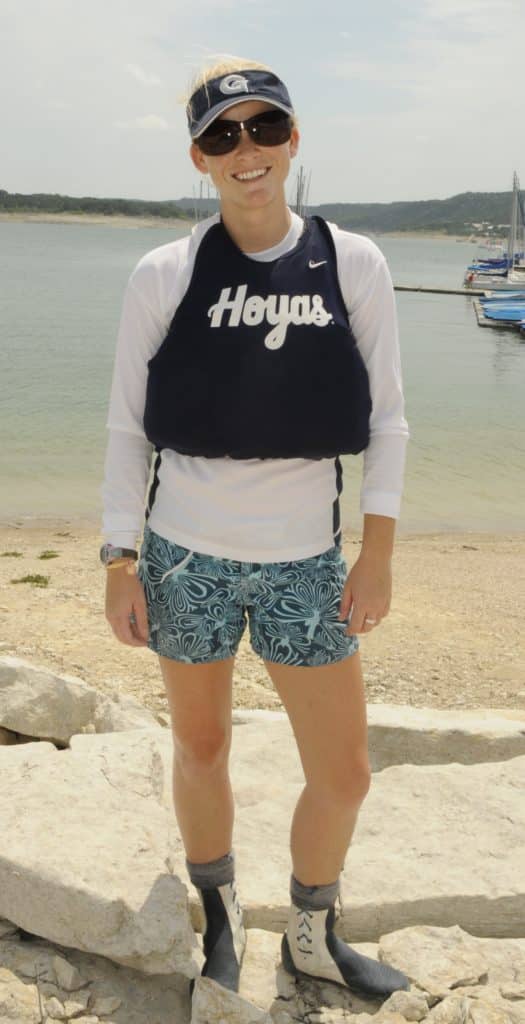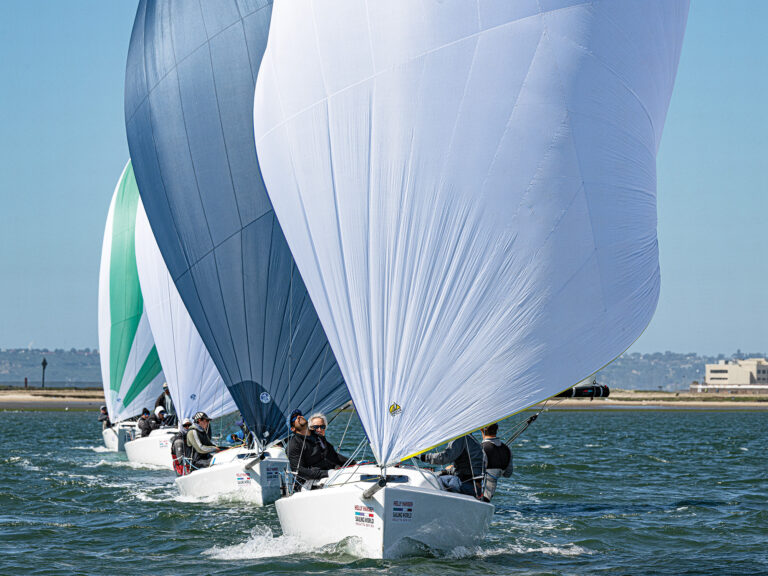
Sydney Bolger
Georgetown senior and four-time All-American Sydney Bolger won every women’s event that she competed in this season, including back-to-back A-division championships at the 2011 and 2012 Women’s Nationals. Although her record may appear flawless, Bolger faced her own challenges this year, such as breaking into the game of team racing. In the end, it was determination and the levelheaded attitude that she brought to the racecourse that allowed her to lock down the Quantum Women’s College Sailor of the Year award while still having a blast on the water.
What changed in your approach that gave you the consistency to win A-division at every event this year?
In college sailing where the courses are very short, a good start is critical. I’ve gotten a lot better at starting and that was a huge part of why our results became more consistent. Also, Rebecca [Evans] and I have sailed together now for about 3 years, and having that amount of time on the water together greatly improved our coordination and boathandling. We were in sync around the racecourse and knew what was going on in each other’s heads, which allowed me to focus on sailing the boat a lot faster and smarter.
Any specific starting tips?
Knowing how much time you need to accelerate, gauging your distance from the line, and knowing how much space you need to start in any given condition are critical. It’s important to be aggressive on the line and make sure that you’re not allowing anyone else to control your start, while also being flexible. If we knew at 20 seconds that our start was not going to be ideal, we were quick to bail from our position and find a new spot on the line. Sometimes that meant closely ducking every boat on port in order to be the rightmost boat, just to get clean air with options off the line**.
**
How did sailing outside of college help you prepare?
Once I started sailing internationally, I recognized that attention to detail is really what makes the difference between those who succeed at the highest level and those who do not. Also, I’ve learned that if I want to perform at my highest potential, I have to be extraordinarily driven and go into each practice with intensity—it’s the people that practice a lot, that are focused and driven to be the best, that rise to the top.
What would you say was the highlight of your 2011-2012 season?
I would say the Graham Hall team race at Navy. It was the first team race event of my college sailing career, and we won. I remember when we won our first race out there and it was such a good feeling. It’s a different feeling from fleet racing, where you hold sole responsibility for your performance on the water—it’s very different racing as a three-boat team. It’s a win-lose situation as opposed to, ‘I did well’ or ‘I did poorly,’ and that concept of straight-up losing is tough. It was really exciting to win that event.
Was team racing a challenge for you?
Developing team racing skills on the fast track was one of the more stressful and frustrating aspects of sailing that I’ve ever experienced. I definitely hit a wall at one point, but I got past it and improved throughout the season. Team racing was a totally new thing for me, and unlike the racing that I’d done previously and was used to, I wasn’t building off of previous skills sets. I was basically starting at zero, which I hadn’t experienced yet in my college career. But team racing also really improved my fleet racing in terms of boathandling and the fact that it requires a lot of anticipation.
**
Did you try to bring a certain mindset to all of your regattas this year?**
I knew that I needed to go into regattas relaxed and with confidence, because if I started to stress everything was going to go down the tubes. Rebecca and I just had a lot of fun this last year sailing. There was this one race at St. Mary’s [Intersectional] where I tacked too close rounding the windward mark and had to do a 720 around the offset. In doing the 720, I nicked the back of another boat, and had to do another 720…Instead of doing anything rash or getting upset, we did our circles, focused on catching boats, and came back in that race to around seventh. I think that can be fully attributed to our calm mentality. We tried to keep an even keel in the boat, which allowed us to keep our heads in the game, to pass boats when it was necessary, and to maintain consistent scores throughout regattas.
What was it like to sail with two other All-Americans on your team, including Chris Barnard, who was also named College Sailor of the Year?
It was great. Georgetown has had some really phenomenal sailors while I’ve been there, including Chris Barnard and Charlie Buckingham, who was named College Sailor the Year twice. It’s fantastic to have these really talented sailors on the team because it raises the level of competition, but equally important are all the other members of the sailing team. At Georgetown we have the “as one” philosophy, which basically means that it’s the responsibility of everyone on the team to push themselves so everyone gets better. Every single person on the team is critical to our overall success.
You graduated from Georgetown this spring. What lies in store for you next?
In terms of sailing, my plan is to begin a full-time Olympic campaign in the 470. I’m going to move to Miami in the fall, find a crew, and begin training full-time with the U.S. Sailing Team Development Team. I intend to compete in the full world circuit for the next three years, with hopes of competing at the 2016 Olympics in Rio. Beyond that I’d also like to continue team racing, as much as it frustrated me a lot of the time. **–A.Q. **









